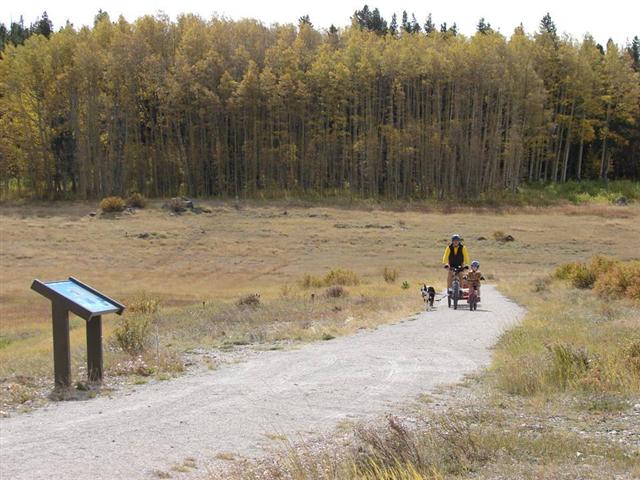
Yesterday the Supreme Court dealt a blow to rails-to-trails efforts. In an 8-1 decision, the court ruled that lands granted to railroad companies by the federal government do not necessarily revert to government lands when they are abandoned. (Justice Sonia Sotomayor issued the lone dissenting opinion.)
The court ruled in favor of the estate of Marvin Brandt, who owned 88 acres bisected by the planned expansion of the Medicine Bow Rail Trail in Wyoming. The decision could set up a deluge of cases where adjoining property owners claim lands that were formerly railroad rights of way. The Supreme Court overturned the decision of the 10th Circuit Court of Appeals, which must now reconsider the case.
Kevin Mills, Rails-to-Trails Conservancy's senior vice president of policy and trail development, spoke with us about the implications of Marvin M. Brandt Revocable Trust v. The United States [PDF] for trails around the country:
What is your organization's reaction to the decision?
We’re definitely deeply disappointed. We’re exploring what recourse we might have as it is remanded down to the 10th Circuit.
What does it mean for rail trails in the U.S.?
The first thing to know is that this is a case about federally granted rights of way. Those are something that’s significant in the western United States and not so much in the eastern United States. The background is, the federal government had land and wanted to get the railroads built across the land and granted land. The question was, does that property interest revert back to the federal government and not to the adjoining land owners?
How will this affect your work on behalf of trails?
I think the main observation: [Projects are] more vulnerable to litigation from adjoining landowners. The question is, how can we look to limit the damage that comes from all that litigation?
This case was bankrolled by interest groups seeking a very specific interpretation of private property rights, including the Koch brothers-backed Cato Institute. Does Rails-to-Trails frequently clash with this group?
There has certainly been historically quite a number of [contentious property rights] cases, those cases have often been settled, at a cost, or litigated -- that is also a transaction cost. It’s definitely part of the landscape here. This is not something that’s going to come in and affect every rail trail next week.
How many trails fall under the purview of this ruling?
It’s a significant number. That question was put to the federal government in this case. They couldn’t answer. The government’s never kept data on it.
What was the argument from the opposition?
It was argued in the Supreme Court by an organization that represents private property interests. Mr. Brandt, who has been named plaintiff, is not alive. This was not about Mr. Brandt pursuing his private property rights, it was his trust. These interest groups are pursuing it to make a point to expand private property interests over public property interests.
What was Rails-to-Trails argument?
Our argument is that the federal government had granted these rights of way for the railroads to cross the country and if they no longer needed them they would revert to the federal government. It’s been long established that railroad rights of way are pretty unique. If you look at the whole history of law relating to this case, there was public interest relating to the property.
What the majority did was look at this 1940s case that was decided about mineral rights and they said that's the precedent we want to follow. That case said it was considered an easement. Part of what Justice Sotomayor’s defense said [was that] the majority didn’t meaningfully grapple with the two cases that came before that. The lone dissenter in this case makes a good argument, derived from the argument we were trying to make, but obviously it didn’t carry the day in court.
How would ambiguity about land ownership come about in one of these cases?
They have to make some argument that they have a property interest. Historically, in this case it probably relates to homesteaders. I think there are many cases in which there is ownership, and there are also cases where adjacent landowners think there is ownership and there isn't. Every scenario you could imagine is among the possibilities.
And so those all have to end up in court?
Exactly, I think there's going to be more litigation.
How will Rails-to-Trails proceed?
One piece of that is legal and we don’t have all the answers yet. We’re trying to huddle with the Department of Justice and the state attorneys general that supported us [in earlier court decisions] and figure out what is the legal strategy if this is remanded to the 10th Circuit, discover if there are changes to narrow the scope [of the decision]. That’s more short-term.





